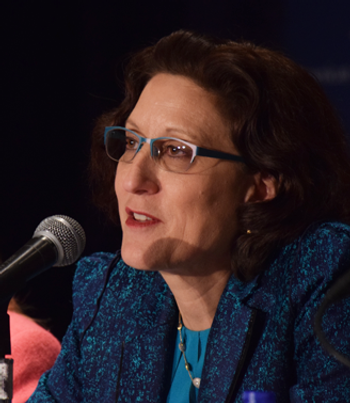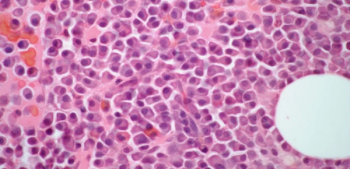
Dietary, pet, and social contact restrictions did not have any effect on infectious complications in children undergoing intensive treatment of acute myeloid leukemia.

Your AI-Trained Oncology Knowledge Connection!


Dietary, pet, and social contact restrictions did not have any effect on infectious complications in children undergoing intensive treatment of acute myeloid leukemia.

Lymph node status after undergoing neoadjuvant chemotherapy and resection of esophagogastric cancer was the only independent predictor of survival.

Similar survival outcomes were seen in lymphoma patients who underwent related donor haploidentical HCT and HLA-matched sibling donor transplant.

Researchers were able to molecularly classify endometrial cancers with distinct survival differences using a new classification tool called ProMisE that uses clinically applicable methods.

CD38 expression was associated with response to daratumumab monotherapy in patients with multiple myeloma.

Cabozantinib significantly improved the overall survival of patients with previously treated advanced RCC, according to the second interim analysis of the METEOR trial.

Patients with follicular lymphoma that responded to rituximab but whose disease later underwent histologic transformation were found to have worse outcomes and may benefit from autologous stem cell transplantation.

Patients with HIV-related lymphoma who underwent autologous hematopoietic cell transplant had good survival at 1 year, similar to patients without HIV.

Crenolanib, a type I pan FLT3 inhibitor, had activity in a group of patients with FLT3-positive acute myeloid leukemia (AML), including a number of patients with FLT3 D835 mutations.

New research has shown that a higher dose of CTL019 with split dosing was associated with reduced toxicity in adult patients with relapsed, refractory CD19-positive ALL.

A retrospective study looking at a small number of women diagnosed with and treated for lymphoma while pregnant found that systemic therapy given after the first trimester was safe and resulted in acceptable maternal and fetal outcomes.

Researchers were able to identify a subset of patients with smoldering multiple myeloma who have a greater than 80% risk of progressing to myeloma within 2 years.

OPT-822/821 vaccination did not show any improvement in progression-free survival as maintenance therapy compared with placebo for metastatic breast cancer. But in those patients who had an immune response, the vaccine did appear to show activity.

Heavily pretreated women with metastatic breast cancer had significant improvements in progression-free survival and overall response rate when treated with the combination of utidelone plus capecitabine compared with capecitabine alone.

Monotherapy with the monoclonal antibody isatuximab was effective and well-tolerated in a small study of patients with relapsed and refractory multiple myeloma.

Lenalidomide was able to penetrate ventricular cerebrospinal fluid and was active in a small study of patients with relapsed CNS diffuse large B-cell lymphoma.

A three-drug regimen that includes daratumumab, bortezomib, and dexamethasone may be the new standard of care for patients with relapsed or refractory multiple myeloma.

CPX-351, a liposomal formulation of cytarabine and daunorubicin, improved event-free survival, overall survival, and response compared with a traditional dose of cytarabine/daunorubicin in older patients with high-risk secondary acute myeloid leukemia.

More than half of patients with chronic phase CML who achieved a deep molecular response after nilotinib therapy were able to maintain treatment-free remission.

Maintenance lenalidomide after autologous stem cell transplantation significantly prolonged survival in patients with multiple myeloma, according to results of a meta-analysis.

A study testing the all oral combination of ixazomib, cyclophosphamide, and dexamethasone showed that patients with newly diagnosed multiple myeloma responded well to the experimental treatment regimen.

Use of hypofractionated chemoradiation prior to pancreatoduodenectomy resulted in similar resection rates and outcomes vs standard fractionation.

Details of a first-in-human case report showed that a patient with melanoma was able to achieve a durable complete response with the combination of two types of immunotherapy.

The majority of patients with clear cell renal cancer saw benefit from pazopanib therapy prior to undergoing cytoreductive nephrectomy, according to a single-arm study.

Adding total body irradiation to chemotherapy prior to the adoptive cell transfer of TILs had no effect on tumor regression in patients with metastatic melanoma.

A new study has identified several trends by race and ethnicity among patients with hepatocellular carcinoma (HCC) in the United States.

Gonadotropin-releasing hormone agonist (GnRHa) did not prevent chemotherapy-induced premature ovarian failure in young women with lymphoma.

Grade 3/4 neutropenia is a common adverse event experienced by patients undergoing treatment for relapsed, refractory multiple myeloma with lenalidomide and dexamethasone, a new study has found.

A phase II study of the BCL2 inhibitor venetoclax has shown that a large majority of patients with relapsed or refractory chronic lymphocytic leukemia responded to treatment with the drug.

Partaking in physical activity was associated with a reduction in risk for as many as 13 cancer types regardless of body size or smoking history.